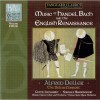| Country: | England |
| Period: | Renaissance, Baroque |
Biography
Richard Dering (c. 1580–1630) — also Deering, Dearing, Diringus, etc. — was an English Renaissance and Baroque composer. Despite being English, he lived and worked most of his life in the Spanish-dominated South Netherlands owing to his Roman Catholic faith.
Dering was likely a Protestant in England in his early life, but later converted to Roman Catholicism during a trip to Italy in his early thirties. He was born the illegitimate son of Henry Dering of Liss, Hampshire. It is known that by 1610 he had traveled to Italy as well as gaining a BMus in that year from Christ Church, Oxford.
From 1612–16 he traveled with the British ambassador to Venice, and in 1617 it is known that he was organist to the community of English Benedictine nuns in Brussels. He returned to England in 1625 as organist to the Catholic Queen Henrietta Maria and 'musician for the lutes and voices' to Charles I.
Dering wrote three books of motets with continuo, two of canzonets and one of continuo madrigals, and is represented in many MSS and anthologies. His music shows varying degrees of Italian influence; the continuo madrigals and small concertato motets are very much in the idiom of Alessandro Grandi or d'India, with wayward modulations and dramatic expression; the Cantica Sacra (1618) contains 6-part motets that recall a more conventionally expressive Italian madrigal-like idiom.
Dering's music must have had a wide appeal, for much of it was brought out by the enterprising Antwerp publisher Pierre Phalèse the Younger between 1612 and 1628. Dering's two- and three-voice pieces were published in London by John Playford in 1662, long after the composer's death, but they may have been written in the Spanish Netherlands, for one has a text honoring St James as patron saint of Spain. It is likely that Dering took the pieces with him to England: they were certainly sung in Henrietta's chapel, and they were used for private devotion during the Commonwealth (when they were reputedly Oliver Cromwell's favorite music).







